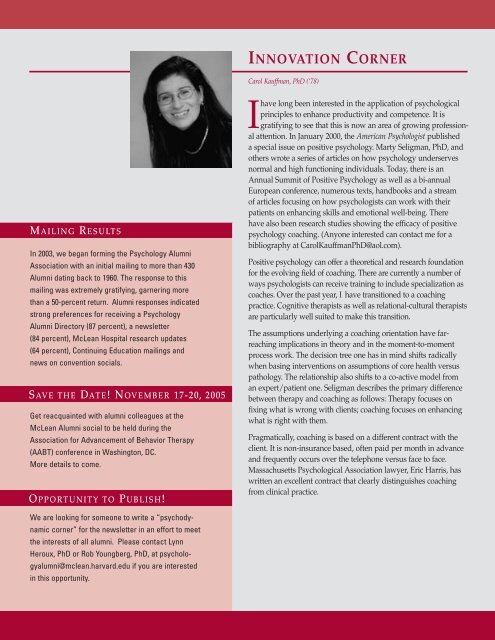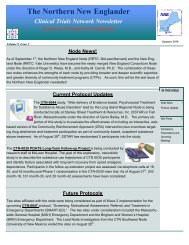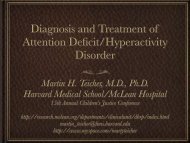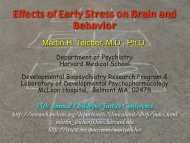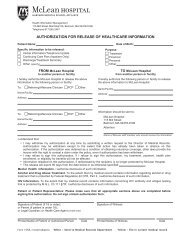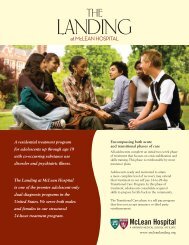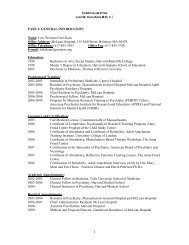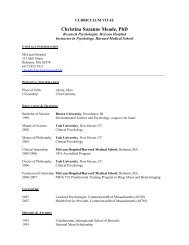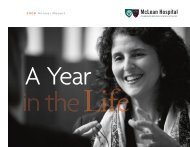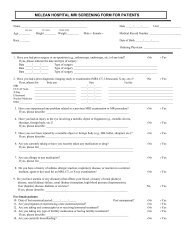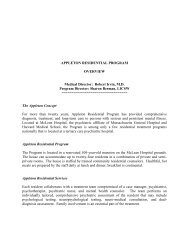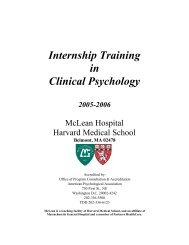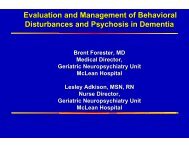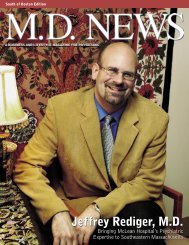Spring 2005 - McLean Hospital
Spring 2005 - McLean Hospital
Spring 2005 - McLean Hospital
You also want an ePaper? Increase the reach of your titles
YUMPU automatically turns print PDFs into web optimized ePapers that Google loves.
INNOVATION CORNER<br />
Carol Kauffman, PhD (‘78)<br />
M AILING R ESULTS<br />
In 2003, we began forming the Psychology Alumni<br />
Association with an initial mailing to more than 430<br />
Alumni dating back to 1960. The response to this<br />
mailing was extremely gratifying, garnering more<br />
than a 50-percent return. Alumni responses indicated<br />
strong preferences for receiving a Psychology<br />
Alumni Directory (87 percent), a newsletter<br />
(84 percent), <strong>McLean</strong> <strong>Hospital</strong> research updates<br />
(64 percent), Continuing Education mailings and<br />
news on convention socials.<br />
S AVE THE DATE! NOVEMBER 17-20, <strong>2005</strong><br />
Get reacquainted with alumni colleagues at the<br />
<strong>McLean</strong> Alumni social to be held during the<br />
Association for Advancement of Behavior Therapy<br />
(AABT) conference in Washington, DC.<br />
More details to come.<br />
O PPORTUNITY TO P UBLISH!<br />
Ihave long been interested in the application of psychological<br />
principles to enhance productivity and competence. It is<br />
gratifying to see that this is now an area of growing professional<br />
attention. In January 2000, the American Psychologist published<br />
a special issue on positive psychology. Marty Seligman, PhD, and<br />
others wrote a series of articles on how psychology underserves<br />
normal and high functioning individuals. Today, there is an<br />
Annual Summit of Positive Psychology as well as a bi-annual<br />
European conference, numerous texts, handbooks and a stream<br />
of articles focusing on how psychologists can work with their<br />
patients on enhancing skills and emotional well-being. There<br />
have also been research studies showing the efficacy of positive<br />
psychology coaching. (Anyone interested can contact me for a<br />
bibliography at CarolKauffmanPhD@aol.com).<br />
Positive psychology can offer a theoretical and research foundation<br />
for the evolving field of coaching. There are currently a number of<br />
ways psychologists can receive training to include specialization as<br />
coaches. Over the past year, I have transitioned to a coaching<br />
practice. Cognitive therapists as well as relational-cultural therapists<br />
are particularly well suited to make this transition.<br />
The assumptions underlying a coaching orientation have farreaching<br />
implications in theory and in the moment-to-moment<br />
process work. The decision tree one has in mind shifts radically<br />
when basing interventions on assumptions of core health versus<br />
pathology. The relationship also shifts to a co-active model from<br />
an expert/patient one. Seligman describes the primary difference<br />
between therapy and coaching as follows: Therapy focuses on<br />
fixing what is wrong with clients; coaching focuses on enhancing<br />
what is right with them.<br />
Pragmatically, coaching is based on a different contract with the<br />
client. It is non-insurance based, often paid per month in advance<br />
and frequently occurs over the telephone versus face to face.<br />
Massachusetts Psychological Association lawyer, Eric Harris, has<br />
written an excellent contract that clearly distinguishes coaching<br />
from clinical practice.<br />
We are looking for someone to write a “psychodynamic<br />
corner” for the newsletter in an effort to meet<br />
the interests of all alumni. Please contact Lynn<br />
Heroux, PhD or Rob Youngberg, PhD, at psychologyalumni@mclean.harvard.edu<br />
if you are interested<br />
in this opportunity.


